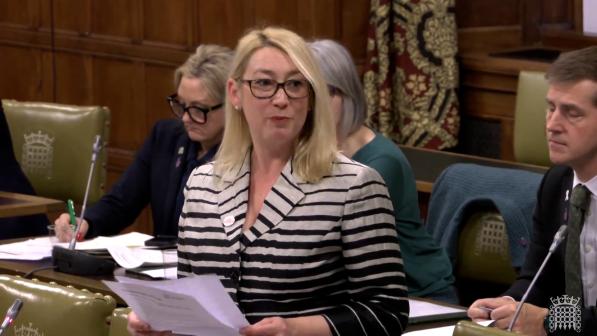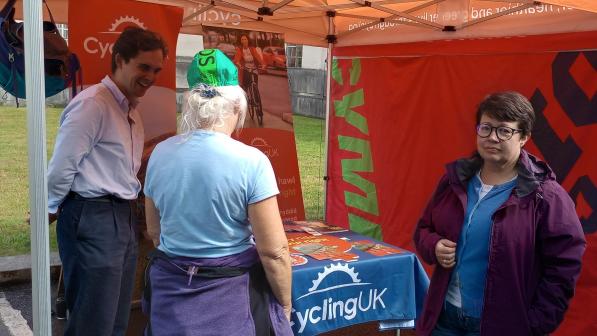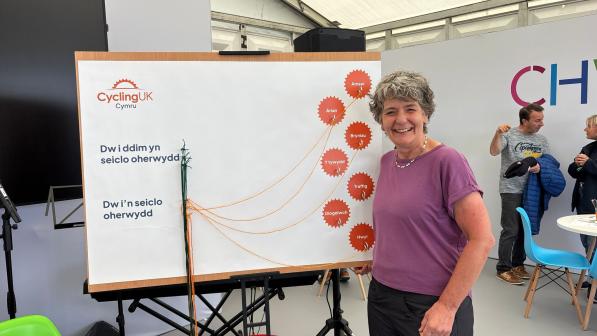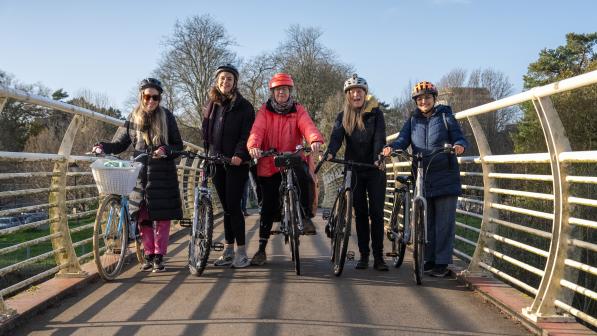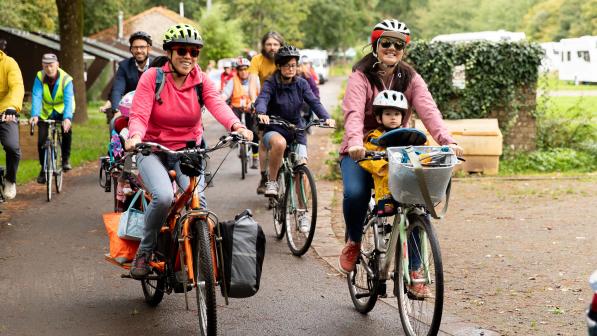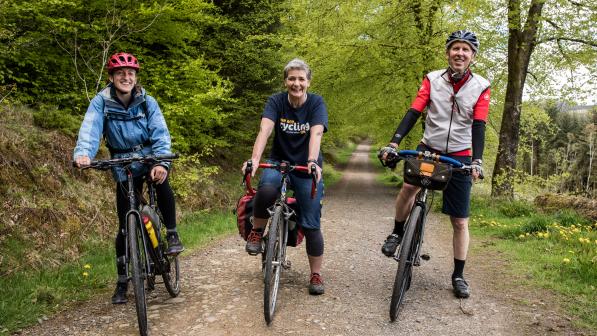‘My ride. Our right’ at the Eisteddfod

Coming from a family of first language Welsh speakers, the annual visit to the Eisteddfod is a chance to meet up with family and wander around soaking up the atmosphere. It’s also an occasion where I lament the fact that my learning of the language over the years has been somewhat sporadic.
This year was different, however, for a couple of reasons. Firstly, working with Transport for Wales and one of our local Cycle Advocacy Network reps we were going to be holding our first ever Eisteddfod event, a panel discussion.
Secondly, having decided that it’s about time I learnt Welsh properly, I was going to use my Welsh in a work capacity to introduce the discussion on our women’s campaign.

So what is the Eisteddfod
Paul Bevan, the local CAN Representative, who was instrumental in helping us be at the Eisteddfod, explains:
The National Eisteddfod is one of the most important events held in Wales, with over 150,000 people attending. This year it was held in Wrecsam, and as well as being a cultural event the Eisteddfod is a platform for discussing all kinds of subjects important to Wales with a wide range of politicians and national organisations attending along with the public. While the language of the Eisteddfod is Welsh the whole event is open to all, and many non-Welsh speakers and learners attend and enjoy the discussions each year
Our day on the Maes
Our hosts for the day were Transport for Wales who play a crucial role in helping make active and sustainable transport available and accessible for people across Wales.
Weather at the Eisteddfod is always unpredictable but other than a wind that did at times make us question the stability of the tent, the weather was kind so people were happily exploring the Maes and we saw a steady stream of visitors who were keen to talk with us about their journeys by bike.

We like to think that we have a pretty good idea of why people do and don’t ride bikes and our poster board provided a great opportunity to test those thoughts as we chatted to people both about the enjoyment they feel and the barriers they face.
The main event of our day was the panel discussion titled My ride Our right – in Wales, as in the rest of the UK, fewer women than men cycle.
Women make half as many trips by bike as men, and are more likely to be put off cycling by a fear of busy traffic and by the intimidation and abuse that women disproportionately face when going about our daily lives.
The session was expertly chaired by Lowri Joyce, Welsh Language Strategy Lead at Transport for Wales, who said she’s now been inspired to get her bike out of the shed.

The fact that barriers to cycling for women are multi-layered was evident from the answers given by the four expert panel members.
While safety is a primary consideration and well-designed infrastructure a key solution, the panel also considered the wider issues that can make cycling less appealing or achievable for girls and women – from the differing social expectations placed on women to on street harassment and the feeling that cycling isn’t for us.
Rhiannon Letman-Wade, Vice Chair of the Active Travel Board, stressed the need to work with young people if we are to establish behaviours that will last into adulthood:
We need to do more with young people. We know that many girls stop cycling around 14 to 15 years old - if we can show them there’s a way for them to keep cycling, to school for example, they’re more likely to keep cycling in the future. If we can get a 13-year-old girl feeling safe cycling, everyone will feel safe cycling
Alwen, Chief Executive of Ambition North Wales, the body that will be responsible for funding active travel in future years, talked about concerns that she and others face over bike security and feelings of safety:
It doesn’t take a lot for women to lose confidence when something happens when you’re out on the road and I just thought “well it’s easier for me to just ride in the mountains and not have to put up with the traffic”
Dafydd Trystan, long-time active travel advocate and former Chair of the Active Travel Board, drew parallels with the challenges many women also face when running and also stressed that one bad experience can be enough to put people off:
If you are nervous in the first place, then when you have one bad experience, you just stop cycling. So we have to do everything we can to make sure the barriers back are as low as possible to support people back to cycling
Gwen Thomas, Strategic Transport Manger at Wrexham CBC, emphasised the need to consider all types of journeys when designing cycle routes and to avoid portraying those who ride bikes as being of a particular type:
I think for me, it’s that we need to ensure we’re not just concentrating on commuting when looking at data and improving cycle infrastructure – commuting only accounts for around 20% of journeys, and there may well be far more women who would be able to go to the shop or take children to school by cycle as would be able to travel to work . Also, our images/idea of a cycle user needs to be broader – encompassing as many different ‘types’ of cycle users as possible
The debate was an important one for us to hold as evidence from Europe shows that if we create an environment where women feel able to get about by bike then we have a far better chance of seeing cycling become a normal everyday activity for everyone
And the Eisteddfod, with it’s important place in Welsh society, was an excellent place for us to have this discussion, as Paul says: “By Cycling UK organising a well-attended discussion on growing the number of women cycling in Wales, they are showing that they are leading the debate around active travel in Wales.”

Chatting on the maes
Also during the day, rather than just enjoying wandering around the Maes without real purpose as I ordinarily do, I took the opportunity to visit some of the other stands to talk to people about our women’s campaign, developing manifestos for forthcoming election and other cycling related stuff, using as much Welsh as I could.
I chatted with the Centre of Alternative Technology about accommodation opportunities for people cycling Traws Eryri and heard about the great work that Pedal Power Wrexham are doing enabling people of all abilities to ride bikes.
I also discussed e-bikes with the police and found out a bit more about political parties plans for developing their manifesto for next year’s Senedd elections and what we can do to influence future policies.
Lobbying for change
Sustained investment in well-designed infrastructure that meets the needs of everyone who wants to get about by bike will be one of our key asks of the next Welsh Government. Without this we risk being stuck with a society where travel choices are limited and women disproportionately lose out.
We need to create an environment where short everyday journeys can be made by bike throughout Wales. With cycling as with using the Welsh language it’s not all or nothing: use the Welsh you have; make the travel changes you can.
